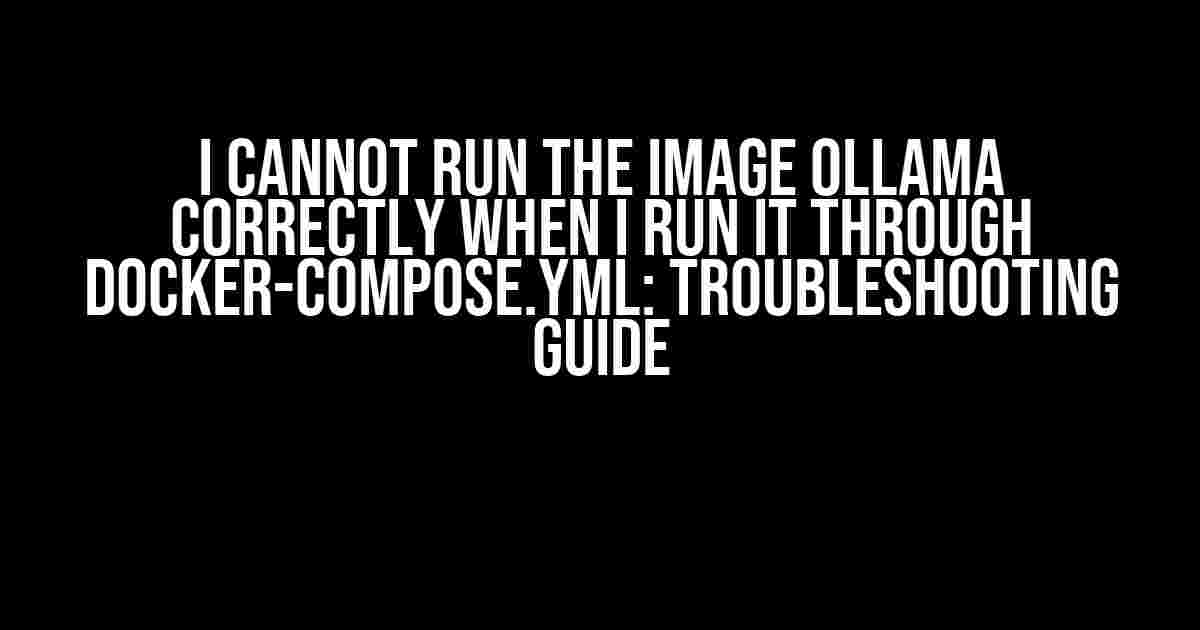If you’re reading this article, chances are you’re frustrated because you cannot run the Ollama image correctly using Docker-Compose. Don’t worry; you’re not alone! In this comprehensive guide, we’ll take you by the hand and walk you through the troubleshooting process to get your Ollama image up and running smoothly.
Prerequisites
Before we dive into the meat of the article, make sure you have the following:
- Docker installed on your system
- Docker-Compose installed on your system
- The Ollama image downloaded or pulled from a repository
- A basic understanding of Docker and Docker-Compose
Step 1: Check Your Docker-Compose.yml File
The first step in troubleshooting is to review your Docker-Compose.yml file. This file is the backbone of your Docker-Compose setup, and any errors or typos can cause issues.
version: '3'
services:
ollama:
image: ollama:latest
ports:
- "8080:8080"
environment:
- OLLAMA_DB_HOST=localhost
- OLLAMA_DB_PORT=5432
Take a closer look at the above example. Make sure:
- The version is correct (in this case, version 3)
- The service name is correctly spelled (in this case, “ollama”)
- The image is correctly specified (in this case, “ollama:latest”)
- The ports are correctly mapped (in this case, “8080:8080”)
- The environment variables are correctly set (in this case, “OLlama_DB_HOST” and “OLlama_DB_PORT”)
Step 2: Check Your Docker Image
Next, let’s verify that the Ollama image is correct and up-to-date.
Run the following command to check if the image is available:
docker images -a | grep ollamaIf the image is not available, you can pull it from a repository using the following command:
docker pull ollama:latestStep 3: Check Your Docker-Compose Command
Now, let’s review the Docker-Compose command you’re using to run the Ollama image.
docker-compose up -dMake sure you’re running the command from the correct directory (i.e., the directory where your Docker-Compose.yml file is located).
Step 4: Check the Docker-Compose Logs
If the above steps don’t resolve the issue, let’s take a closer look at the Docker-Compose logs.
docker-compose logs -f ollamaThe logs will provide valuable information about what’s going on behind the scenes. Look for any error messages or warnings that might indicate the cause of the problem.
Step 5: Check the Ollama Container
Next, let’s investigate the Ollama container itself.
docker ps -a | grep ollamaThis command will list all containers related to Ollama. Check the status of the container:
- If the container is not running, try starting it using
docker start ollama - If the container is running, try accessing it using
docker exec -it ollama bash
Common Issues and Solutions
In this section, we’ll cover some common issues you might encounter when running the Ollama image using Docker-Compose.
Issue 1: Port Conflict
Symptom: You get an error message indicating that port 8080 is already in use.
Solution: Try using a different port by updating the Docker-Compose.yml file:
version: '3'
services:
ollama:
image: ollama:latest
ports:
- "8081:8080"
Issue 2: Environment Variable Error
Symptom: You get an error message indicating that an environment variable is not set.
Solution: Double-check the environment variables in your Docker-Compose.yml file:
version: '3'
services:
ollama:
image: ollama:latest
environment:
- OLLAMA_DB_HOST=localhost
- OLLAMA_DB_PORT=5432
Issue 3: Image Not Found
Symptom: You get an error message indicating that the Ollama image cannot be found.
Solution: Pull the Ollama image from a repository using the command:
docker pull ollama:latestConclusion
By following these steps, you should be able to troubleshoot and resolve the issue with running the Ollama image using Docker-Compose. Remember to:
- Check your Docker-Compose.yml file for errors
- Verify that the Ollama image is correct and up-to-date
- Review the Docker-Compose command and logs for errors
- Investigate the Ollama container for issues
If you’re still having trouble, feel free to comment below, and we’ll do our best to assist you.
| Step | Action | Description |
|---|---|---|
| 1 | Check Docker-Compose.yml file | Review the Docker-Compose.yml file for errors or typos |
| 2 | Check Docker image | Verify that the Ollama image is correct and up-to-date |
| 3 | Check Docker-Compose command | Review the Docker-Compose command for errors |
| 4 | Check Docker-Compose logs | Investigate the Docker-Compose logs for errors or warnings |
| 5 | Check Ollama container | Investigate the Ollama container for issues |
Remember, troubleshooting is all about eliminating possibilities and isolating the issue. By following these steps, you should be able to identify and resolve the problem with running the Ollama image using Docker-Compose.
Here are 5 Questions and Answers about “I cannot run the image ollama correctly when I run it through docker-compose.yml” in a creative voice and tone:
Frequently Asked Questions
If you’re having trouble running the Ollama image with Docker Compose, don’t worry, you’re not alone! Check out these frequently asked questions to get back on track.
What could be the reason for Docker Compose not running the Ollama image correctly?
One common reason for this issue is that the Docker Compose file (docker-compose.yml) might not be properly configured. Double-check that the file is in the correct format, and the image name, version, and dependencies are accurately specified.
Could a permissions issue be causing the problem?
Yes, that’s possible! Make sure you have the necessary permissions to run Docker Compose. Try running the command with elevated privileges using `sudo` or checking the permissions on the docker.socket file.
What if I’ve made changes to the docker-compose.yml file, but they’re not taking effect?
If you’ve made changes to the docker-compose.yml file, try running `docker-compose up -d` to rebuild the container. This will ensure that the changes are applied correctly. You can also try deleting the container and running `docker-compose up` again to start fresh.
Could the issue be related to the Docker network?
Yes, that’s possible! Check that the Docker network is configured correctly, and the Ollama image is connected to the right network. You can use `docker network ls` to list all the networks and `docker network inspect` to inspect a specific network.
How can I troubleshoot the issue further?
To troubleshoot the issue further, try running `docker-compose up` with the `–verbose` flag to get more detailed output. This will help you identify any specific errors or warnings that might be causing the problem. You can also check the Docker logs using `docker logs` to get more information.


